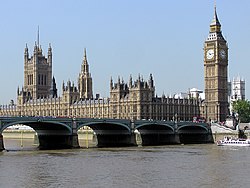Westminster Parliament
| Parliament of the United Kingdom of Great Britain and Northern Ireland | |
|---|---|
| 56th UK Parliament | |
 |
|
| Type | |
| Type | |
| Houses |
House of Lords House of Commons |
| Leadership | |
|
Elizabeth II
Since 6 February 1952 |
|
|
The Lord Fowler
Since 1 September 2016 |
|
|
John Bercow
Since 22 June 2009 |
|
| Structure | |
| Seats |
|
 |
|
|
Lords political groups
|
Crossbench
Other groups
Lords Spiritual
|
 |
|
|
Commons political groups
|
Other Opposition
|
| Elections | |
|
Commons last election
|
7 May 2015 |
| Meeting place | |
 |
|
| Palace of Westminster, London, United Kingdom | |
| Website | |
| www.parliament.uk | |
Crossbench
Other groups
Lords Spiritual
Other Opposition
The Parliament of the United Kingdom, commonly known as the UK Parliament or British Parliament, is the supreme legislative body in the United Kingdom, British Crown dependencies and British overseas territories. It alone possesses legislative supremacy and thereby ultimate power over all other political bodies in the UK and its territories. Its head is the Sovereign of the United Kingdom (currently Queen Elizabeth II) and its seat is the Palace of Westminster in the City of Westminster, one of the boroughs of the British capital, London.
The parliament is bicameral, consisting of an upper house (the House of Lords) and a lower house (the House of Commons). The Sovereign forms the third component of the legislature (the Queen-in-Parliament). The House of Lords includes two different types of members: the Lords Spiritual, consisting of the most senior bishops of the Church of England, and the Lords Temporal, consisting mainly of life peers, appointed by the Sovereign on the advice of the Prime Minister, and of 92 hereditary peers, sitting either by virtue of holding a royal office, or by being elected by their fellow hereditary peers. Prior to the opening of the Supreme Court in October 2009, the House of Lords also performed a judicial role through the Law Lords.
...
Wikipedia
